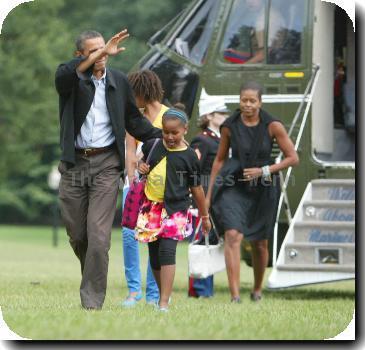Japanese hope Obama become first US president to visit atomic bomb cities
By Malcolm Foster, APTuesday, October 27, 2009
 Japanese hope Obama will visit A-bomb cities soon
Japanese hope Obama will visit A-bomb cities soon
TOKYO — A speech and a Nobel prize have raised hopes in Japan that Barack Obama will become the first sitting American president to visit Hiroshima or Nagasaki, the two cities devastated by U.S. atomic bombs in World War II.
Past presidents have avoided a visit that could raise controversy at home, and U.S. officials say it is highly unlikely Obama will travel to either city during a two-day stop in Tokyo next month.
On Tuesday, the mayors of Hiroshima and Nagasaki went to the U.S. Embassy in Tokyo to formally invite Obama to their cities before a U.N. review of the Nuclear Non-Proliferation Treaty next May.
Sunao Tsuboi, an 84-year-old who survived the Hiroshima bombing despite severe burns, is part of a growing chorus of survivors, student groups and newspaper editorials urging Obama to come.
“Obama has a vision for humanity. … We want to show him our support,” said Tsuboi, who has campaigned for the elimination of nuclear weapons and is co-chair of a nationwide organization for atomic bomb survivors.
“I’m a victim, and I’ve overcome,” he said. “We want to join with President Obama to create a peaceful world.”
Obama has not suggested he would make a visit, but stoked Japanese hopes with an April speech in Prague calling for a world free of nuclear weapons. Winning the Nobel Peace Prize earlier this month further heightened expectations.
“Many of the past Nobel Peace laureates have visited ground zero,” the Hiroshima-based Chugoku newspaper said in an editorial. “We urge him to go and see the place himself and renew his commitment to a nuclear-free world.”
The White House declined to comment on the invitation. A visit to either city would be a treacherous political minefield for any U.S. president. Signs of sympathy toward Japanese suffering could be seen as criticism of the decision to drop the bombs — viewed among many Americans as a pragmatic decision to hasten the end of the war that the U.S. entered after Japan attacked Pearl Harbor on Dec. 7, 1941.
Others see it as a crime against humanity.
Fashion designer Issey Miyake, in a July op-ed piece in The New York Times, revealed he is a survivor of the Hiroshima atomic bomb and called on Obama to visit the city.
Tsuboi was 20 when he was caught in the flash of the bomb’s explosion above Hiroshima on Aug. 6, 1945, which killed an estimated 140,000 people. His body was covered with burns, and it took him a year to walk again.
The U.S. dropped a second bomb on Nagasaki on Aug. 9, killing 80,000. Six days later, Japan surrendered, ending World War II.
“A lot has happened between our countries,” said Tsuboi. “We don’t want to look to the past; we want to look to the future.”
Analysts note that Obama has his hands full with the war in Afghanistan and health care reform. A visit to Hiroshima or Nagasaki could expose him to a new line of attack from opposition Republicans, who might accuse him of second-guessing the decision to bomb the cities.
“He can’t be seen as denigrating the good fight,” said James Orr, chairman of the East Asian Studies Department at Bucknell University. “He would have to be very careful that he recognize on the U.S. side the value of service to country as well as express sensitivity to the human suffering involved.”
The president also has been low-key about the Nobel Peace Prize and wouldn’t want to leave the impression that it is shaping his foreign policy.
Former President Jimmy Carter stopped by the atomic bomb memorial in Hiroshima in 1984, after he was out of office. The highest-ranking American to visit while in office is House Speaker Nancy Pelosi, who went last year.
Many Japanese were impressed when new U.S. Ambassador John Roos visited Hiroshima earlier this month, just weeks after he arrived in Tokyo.
Yuji Kanemori, a 17-year-old from Hiroshima, helped form an anti-nuclear student group called “NoNukesHiroshima” that has written letters to Obama. The students are folding 23,000 paper birds — representing the estimated number of nuclear weapons in the world — that they hope to deliver to the president either in Washington or Hiroshima, should he ever visit.
While some debate the historical and moral aspects of the bombing, Kanemori said his group has a simple goal: “We just don’t want it ever to be repeated.”
Associated Press writers Mari Yamaguchi in Tokyo and Ken Guggenheim and Jennifer Loven in Washington contributed to this report.
On the Net:
Student anti-nuclear group: www.nonukehiroshima.com
Japan Confederation of A- and H-bomb Sufferers: www.ne.jp/asahi/hidankyo/nihon/english/about/about5-index.html
Tags: Asia, Barack Obama, Bombings, East Asia, Events, Japan, Nobel Prizes, North America, Nuclear Weapons, Political Issues, Tokyo, United States, Weapons Administration, Weapons Of Mass Destruction

